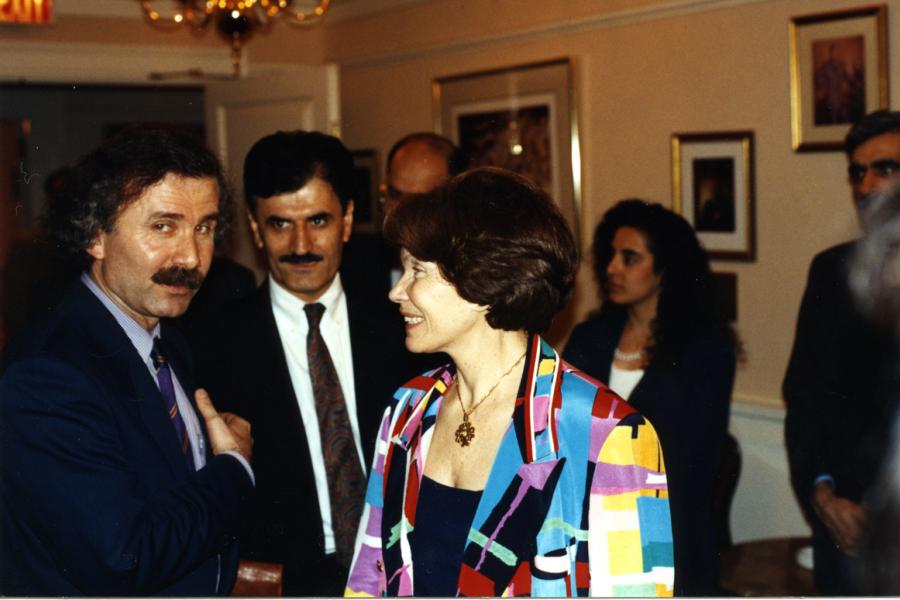Sunday, 1 November, 2020 , 19:21
We are deeply saddened to announce the death of our dear friend Dr. Najmaldin Karim, vice-president of our Institute, on the night of Friday October 30 to Saturday October 31 in Washington at the age of 71, following a long illness.
Renowned neurosurgeon, militant since his university years of the Kurdish cause, patriot in solidarity with Kurdish resistance movements in all parts of Kurdistan, talented diplomat, elected governor of the emblematic Kurdish city of Kirkuk from 2011 to 2017, he was known and loved throughout Kurdistan as well as in the Kurdish diaspora.
His untimely death is a great loss for his family, for the Kurdish Institute and his friends and for the Kurdish cause as a whole.
Born in August 12, 1949 in Kirkuk, where he completed his primary and secondary studies, he was admitted to the Faculty of Medicine at the University of Mosul. During his college years, he was active in the Students Union of Kurdistan of which he became one of the leaders. Upon obtaining his medical degree in 1972, he joined the ranks of the Kurdish resistance under General Mustafa Barzani. After the collapse of the latter following the Algiers Accord of March 5, 1975, signed between the Shah of Iran and Saddam Hussein on the back of the Kurds, he went into exile in the United States. There, he completed his studies in Neurosurgery at the George Washington University. Along with his professional activity at the prestigious Johns Hopkins Hospital, he continued to campaign for the Kurdish cause by co-founding the Kurdish National Congress of North America and he joined in 1989 the Kurdish Institute of Paris, where he became vice-president and played an important role in the preparation of the International Conference on the fate of the Kurds after the Gulf War, co-organized by the Kurdish Institute of Paris and Foreign Relations Committee of the U.S. Senate on February 27, 1991 with the participation of several American senators, including Edward Kennedy, John Kerry, Nancy Pelosi, of Iraqi Kurdish leaders and Danielle Mitterrand.
This conference played a major role on informing and sensitizing the American Congress on the Kurdish question. Its participants mobilized during the Kurdish exodus of spring 1991 to obtain the commitment of the American administration in favor of the creation of a Safe Haven, a no-fly zone proposed by France and decided in June 1991 by the UN Security Council which allowed the emergence and recognition of the current Autonomous Region of Kurdistan. In 1994, Dr. Karim, along with Kendal Nezan and Fuad Hussein, current Minister of Foreign Affairs of Iraq, was a member of the delegation of the Kurdish Institute dispatched to Kurdistan to convince the leaders of the two Iraqi Kurdish parties in conflict (KDP and PUK) to come and participate in the peace talks organized in France, at the Château de Rambouillet, under the high patronage of President Mitterrand, in order to settle their differences in a negotiated and peaceful manner. In 1996, Dr. Karim founded the Washington Kurdish Institute, in order to inform and sensitize the Congress and the American media on the plight of the Kurdish people.
General Barzani's personal doctor until his death in exile in Washington in March 1979, then of the Kurdish leader Jalal Talabani, who later became Iraq's first elected president, Dr. Karim provided his care and advice to number of Kurdish resistance fighters from all over the World and from all parts of Kurdistan passing through Washington. He also promoted their contacts with the Congress, think thanks,NGOs and the American media. He was in fact the voluntary ambassador of Kurdistan in Washington.
After the fall of Saddam Hussein in 2003, at the request of his friend Jalal Talabani, he became involved in Kurdish and Iraqi politics. First elected as a member of the Iraqi Parliament in 2010, he then established and headed an electoral list named Alliance of Kurdistan which largely won the Kirkuk provincial elections. Elected governor of his hometown, in a difficult political and security context, he organized basic services for all the inhabitants of this predominantly Kurdish city with large Turkmen, Arab and Christian communities, without discrimination. Very popular with his constituents, he remained governor of Kirkuk until October 2017 when Iraqi troops and militias occupied the city. Illegally dismissed by the government of Baghdad for having organized the referendum on self-determination in Kurdistan during which the inhabitants of this province overwhelmingly voted in favor of independence, he fell back on Erbil where his team continued to follow up the evolution of the situation in Kirkuk closely.
A year ago he left for Washington for medical chcek-up and care. Operated in September at the Johns Hopkins Hospital by his colleagues, he passed away peacefully, surrounded by his wife Zozan and their four children on Friday, October 30 at around 11 p.m. Washington time.
In accordance with his last wishes, his body will be buried in Kurdistan.
Interview with France24, September 2017.

Dr Najmaldin Karim with Mme. Mitterrand and Kendal Nezan at the Kurdish Institute


